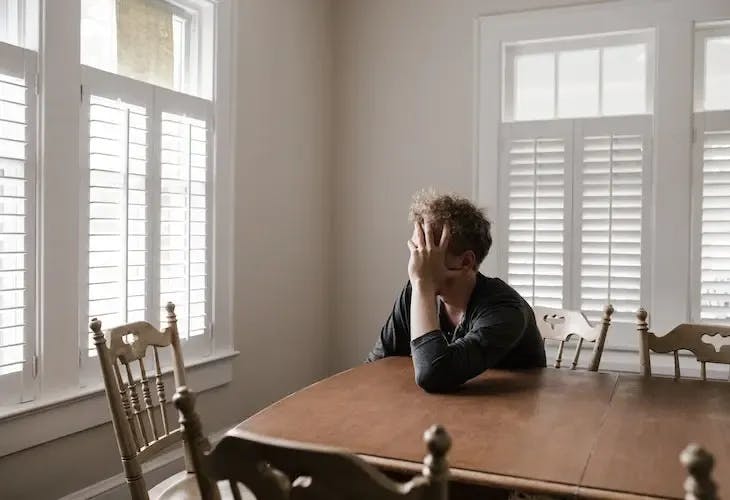
Depression
Have you ever felt uncomfortable at a party, surrounded by people? Don't worry. Whether you need only partial lifestyle changes, a rethinking of your habitual way of thinking, or a journey into the depths of your soul to cure depression, it is one of the most treatable mental illnesses.

What exactly is depression?
Depression is a type of illness that is classified as a mood disorder. If a low mood does not improve after fourteen days, we may begin to suspect that it is approaching moderate depression.
Depression types and how it manifests
Depression can be either endogenous (also known as "internal" or "true") or exogenous (also known as "reactive"). Endogenous depression reasons are more difficult to identify because they are buried within us. It is caused by a chemical imbalance in the brain, which can be innate or acquired during life. Antidepressants are typically used to treat this type of depression.
Exogenous depression can be caused by overexertion and extended stress (for example, burnout syndrome), harsh life events, or trauma. However, the course of depression is generally similar regardless of how the illness began.
Depression is also classified as mild, moderate, or severe. Untreated depression affects the patient's condition and makes depressive moods more severe. Such situations can also lead to utter neglect of self and loved ones, as well as a lack of excitement for life.
What are the signs and symptoms of depression?
Low mood, exhaustion, and loss of interest in things we used to enjoy are the most frequent signs of depression. People suffering from depression frequently experience sleep difficulties, changes in weight and appetite, and thoughts that lead to self-blame and despair. Morning depressive episodes are typically the most acute.
Depression's physical manifestations
Depression frequently manifests itself psychosomatically in addition to severe grief. The following are the most prevalent physical signs of depression:
- a feeling of tightness and pressure in the chest
- pain in the limbs and body
- indigestion
- tics and restlessness in the body
- tremors
- poor balance
- high blood pressure and heart rate
- hot flushes
The difference between depression and a foul mood
Even a negative mood has come to be referred to as depression or "doldrums," such as winter or fall depression, relationship depression, or loneliness. Most of the time, though, these are just mood swings that will pass. Of course, being in a poor mood is unpleasant, but it is not something to be afraid of. It is a normal aspect of the mentality of a healthy person.
However, if you notice that it lasts for an exceptionally long time and affects the quality of your life, it could be the early indicators of depression. At this point, speaking with a therapist can provide welcome relief and assist you in navigating a challenging circumstance more effectively. You will find out if your depression is clinical, i.e. if it can be diagnosed conclusively.
How can I tell if I'm depressed?
A professional will always use psychological exams to get a solid diagnosis. This is usually a clinical psychologist or a psychiatrist, but it can also be a general practitioner. He or she will then make a diagnosis and discuss the proper treatment with the patient based on the psychological tests and the interview. This technique is mostly used for more severe kinds of depression. A therapist can also assist in a therapy session in the case of smaller challenges.
You can also put yourself through a simple and dependable online depression test. The PHQ-9 test has nine questions. In clinical practice, therapists utilize it to detect depressive symptoms.
Try out our free depression test.
Depression treatment - what should I do if I'm depressed?
Depression treatment is an individual process. Depending on the severity of the depression, psychotherapy, medication (usually antidepressants), or a combination of the two is considered. If you are feeling the early stages of depression, search for ways to alleviate yourself until you can visit a specialist. We recommend attempting these tried-and-true depression treatments:
1. Make changes to your daily routine and sleep regimen.
Set up a regular schedule that will take some getting used to, but will eventually have a favorable influence on the hormone levels that are responsible for depressive states. Set a healthy lifestyle and, if possible, avoid alcohol and caffeine.
2. Have faith in a loved one
A private chat can help you overcome the dismal feeling of loneliness. In addition to providing support, the other person will almost definitely provide you with the space to sort out thoughts that may seem terrible in the stillness of your mind. An online therapist will provide a similar service and will be available to you quickly, plus you will be connected with a specialist that specializes in these specific mental health issues.
3. Experiment with exercise, relaxation, or massage.
The mind influences the body, and the body influences the mind. By pleasing your senses, you will also reduce the mental tension that comes with depression. On the internet, you can find a variety of guided relaxation or autogenic training sessions, as well as aromatherapy or a low-impact physical activity.
What exactly is postpartum depression, and why does it occur?
How does postpartum depression appear?
Postpartum depression can appear immediately after the baby is born, but it can also appear after the six-week period is through. Depression can arise in pregnant women as well.
Postpartum depression symptoms include:
- sadness
- exhaustion
- apathy
- fear or anxiety
- irritability
- pessimism
- low self-esteem
- feelings of guilt
- feeling that a woman cannot take care of her child
- tearfulness
- hatred of one's own body
What is lactation psychosis and what are its symptoms?
Lactational or postpartum psychosis is a more severe form of postpartum depression. It most often appears right after childbirth or within the first two weeks, but can occur within two months of giving birth.
Manifestations of lactational psychosis include:
- loss of contact with reality
- hallucinations or delusions
- helplessness
- irritability to aggressiveness
- uncontrollable anxiety
- nightmares, insomnia
- suicidal thoughts
- eating disorders
- memory disorders
For lactation psychosis, immediate treatment is very important, as the mother often loses the ability to care for her baby completely. However, with early treatment, usually with medication or even hospitalization, the symptoms of psychosis usually subside quickly.
What exactly is bipolar disorder?
Bipolar affective disorder is a mental condition that alternates between euphoric and seriously depressed states. A person suffering from depression may be prone to self-harm or even suicide attempts.
Mania may appear to be uneventful or delightful, but the sufferer may not be totally in control of his or her behavior and must subsequently deal with the repercussions.
When this disorder is detected, a psychiatrist should be consulted so that proper medication can be prescribed. Psychotherapy is used in conjunction with treatment.
How do you help someone who is depressed?
Some persons with a depressive disorder may not realize they are depressed; they may dismiss it as a lousy mood and wait for it to pass. Alternatively, people are unwilling to admit their issues or are afraid to seek assistance.
If you feel that someone close to you is depressed, approach the problem with caution. This is because such a person requires the most support and sensitivity. If possible, assist him or her in developing a daily routine and creating a secure area where he or she is not scared to express his or her feelings. Open the topic of professional help as well, and try to talk about it in such a way that it is evident that you are not judging it, but rather that you find it valuable.
Allow for the possibility that your sad loved one's behavior will differ from what you are used to. Don't get frustrated because you're doing everything you can to help your loved one but they don't appear to appreciate it. It's possible that he or she is in a state of depression where he or she simply cannot appreciate it, and it will take time for him or her to recover. But believe in yourself.
Test yourself for depression
You can also test yourself with a quick and reliable online test for depression. The PHQ-9 method test consists of nine questions. It is used by therapists to detect symptoms of depression in clinical practice.
The real story of a client with depression and how psychotherapy helped with that
“Every spring I feel the same, exhausted and as if lifeless. It usually helps to get a lot of sleep, peace and solitude. But somehow it wasn’t enough this year. Weeks were running out and I felt worse rather than better. Gradually, I began to have trouble getting out of the apartment or forcing myself to work, I went shopping only in the most urgent cases, but the worst thing was to pretend to my own family that everything was fine. It occurred to me once that I couldn’t keep living like this. Thank you for the possibility of online psychotherapy, because it would definitely be much harder for me to overcome myself and go out. In therapy, I managed to reveal one fundamental thing – I have filled my life with a lot of responsibilities, which no longer bring me joy or meaning. During that time, I have reconsidered a number of things, and even though there is still some work to do, I finally feel energy and zest for life again after a long time.“Thinking about therapy?

My First Therapy: How to Prepare and What to Expect

What is psychotherapy? And who is it for?


